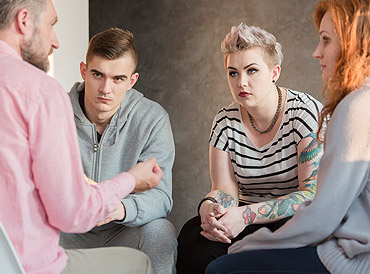Group therapy involves one or more counselors who lead a group of roughly five to 15 patients. Typically, groups meet for an hour or two each week. Some people attend individual therapy in addition to groups, while others participate in groups only.
Many groups are designed to target a specific problem, such as depression, obesity, panic disorder, social anxiety, chronic pain, substance abuse or addiction. Other groups focus more generally on improving social skills, helping people deal with a range of issues such as anger, shyness, loneliness and low self-esteem. Groups often help those who have experienced loss, whether it be a spouse, a child or someone who died by suicide.
Joining a group of strangers may sound intimidating at first, but group therapy provides benefits that individual therapy may not. Counselors say, in fact, that group members are almost always surprised by how rewarding the group experience can be.
Groups can act as a support network and a sounding board. Other members of the group often help you come up with specific ideas for improving a difficult situation or life challenge, and hold you accountable along the way.
Regularly talking and listening to others also helps you put your own problems in perspective. Many people experience mental health difficulties, but few speak openly about them to people they don't know well. Oftentimes, you may feel like you are the only one struggling — but you're not. It can be a relief to hear others discuss what they're going through, and realize you're not alone.

Benefits of Therapy
Psychotherapy has the benefit of giving clients someone to talk to. It can create a new way of looking at difficult problems, and help people move towards a solution.
- Overcoming Past Trauma
- Healthy Coping Mechanisms
- Improved Relationships
- Purging Bad Habits
- Achievement Of Goals

